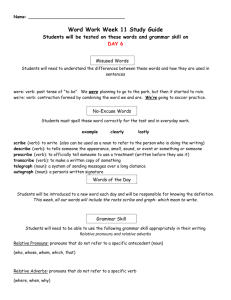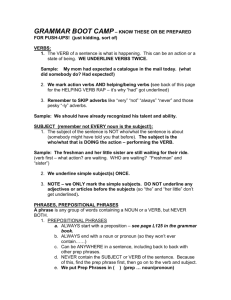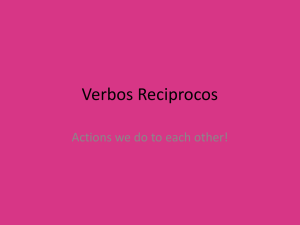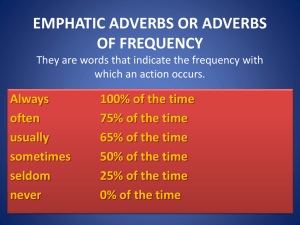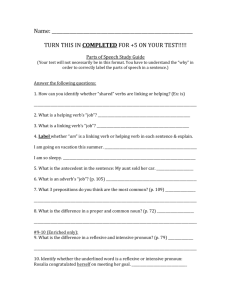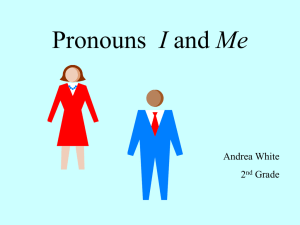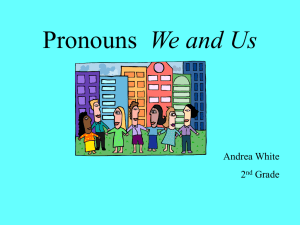Grammar - Effingham County Schools
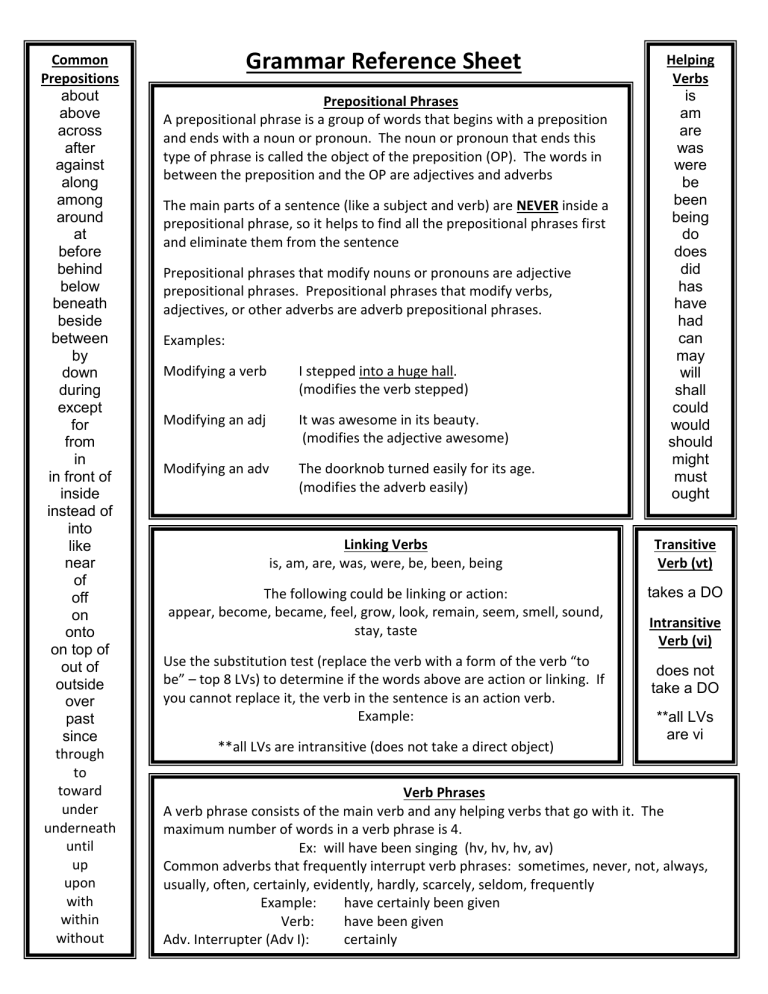
Common
Prepositions about above across after against along among around at before behind below beneath beside between by down during except for from in in front of inside instead of into like near of off on onto on top of out of outside over past since through to toward under underneath until up upon with within without
Grammar Reference Sheet
Prepositional Phrases
A prepositional phrase is a group of words that begins with a preposition and ends with a noun or pronoun. The noun or pronoun that ends this type of phrase is called the object of the preposition (OP). The words in between the preposition and the OP are adjectives and adverbs
The main parts of a sentence (like a subject and verb) are NEVER inside a prepositional phrase, so it helps to find all the prepositional phrases first and eliminate them from the sentence
Prepositional phrases that modify nouns or pronouns are adjective prepositional phrases. Prepositional phrases that modify verbs, adjectives, or other adverbs are adverb prepositional phrases.
Examples:
Modifying a verb I stepped into a huge hall.
(modifies the verb stepped)
Modifying an adj It was awesome in its beauty.
(modifies the adjective awesome)
Modifying an adv The doorknob turned easily for its age.
(modifies the adverb easily)
Linking Verbs is, am, are, was, were, be, been, being
The following could be linking or action: appear, become, became, feel, grow, look, remain, seem, smell, sound, stay, taste
Use the substitution test (replace the verb with a form of the verb “to be” – top 8 LVs) to determine if the words above are action or linking. If you cannot replace it, the verb in the sentence is an action verb.
Example:
**all LVs are intransitive (does not take a direct object)
Transitive
Verb (vt) takes a DO
Intransitive
Verb (vi) does not take a DO
**all LVs are vi
Verb Phrases
A verb phrase consists of the main verb and any helping verbs that go with it. The maximum number of words in a verb phrase is 4.
Ex: will have been singing (hv, hv, hv, av)
Common adverbs that frequently interrupt verb phrases: sometimes, never, not, always, usually, often, certainly, evidently, hardly, scarcely, seldom, frequently
Example: have certainly been given
Verb: have been given
Adv. Interrupter (Adv I): certainly
Helping
Verbs is am are was were be been being do does did has have had can may will shall could would should might must ought
Verb tense
Simple Progressive (add “ing”)
Present add “s” or “es” am / is / are
Perfect (add “ed”)
has / have
Past add “ed” was /were had
Correlative
Conjunctions not only/but also neither/nor either/or both/and
Future add hv “will” will be / shall be will have / shall have
**these rules will not apply to irregular verbs**
Example: Jump
Simple present: jumps Present prog: are jumping Present Perf: have jumped
Simple past: jumped Past prog: were jumping Past Perf: had jumped
Simple future: will jump Future prog: will be jumping Future Perf: will have jumped
Relative
Pronouns that, which, who, whom, whose
Subordinating
Conjunctions after
Reflexive
Pronouns
Coordinating
Conjunctions
Indefinite Pronouns
Do not refer to a specific person, place, thing, or since before while because although so that if when myself yourself himself herself itself ourselves yourselves themselves
(FANBOYS) for, and, nor, but, or, yet, so
Demonstrative
Pronouns
This, that, these, those idea. They often do not have antecedents.
Some are always singular- another, anybody, anyone, anything, each, either, everybody, everyone, everything, neither, nobody, no one, nothing, one, somebody, someone, &
something. Some are always plural- both, few,
many, & several. Some can be either singular or plural (all, any, most, none, & some). whenever which, who, whom, whose,
Sentence Type
A.
Simple sentence (SS): contains 1 ind. clause Ex: The man standing in the doorway is my Uncle Fred.
B.
as even though until unless as if by a semicolon
Interrogative
Pronouns what
Sentence purpose
Declarative – makes a statement and ends in a period
Interrogative – asks a question and ends in a question mark
Imperative – gives a command and ends in a period
Exclamatory – expresses strong feelings and ends in an !
Compound sentence (CD): contains 2+ ind. clauses joined by a conjunction & a comma or may be joined
Ex: I like dogs; he likes cats.
Ex: Marty is the leader of the group, but he is not the best person for the job
C.
Complex sentence (CX): contains 1 ind. clause plus 1+ dep. clauses
Ex: Before he went to the job interview, he got a haircut.
D.
Compound – Complex sentence (CD-CX): contains 2 ind. clauses joined by a conjunction or semicolon,
and 1+ dependent clauses
Ex: Bob is a doctor, and he is a man who cares about people.
Adjectives Adverbs
Which one? How?
What kind? When?
How many? Where?
To what extent?
Adjectives modify nouns and pronouns
Adverbs modify adjectives, verbs, & other adverbs
“Not” is ALWAYS an adverb!!
The following are adjectives: articles (a, an, the), possessive pronouns
(my, your, his, her, etc.), demonstrative pronouns, & possessive nouns
(Mrs. Mealor’s coat)
Clauses
Each clause must have a subject and verb
2 types of clauses
1.
Independent clause (also called main clause or simple sentence)
every sentence must have at least one ind. clause that can stand alone
does not start with a relative pronoun or subordinating conjunction
2.
Dependent clause (also called subordinate clause)
can never stand alone
starts with a relative pronoun or a subordinating conjunction
2 types of dependent clauses o Adverb dep. clauses
Usually modifies the verb in the independent clause
Usually starts with a subordinating conjunction
If it appears at the beginning of the sentence, it should be followed by a comma o Adjective dep. clauses
Usually modifies the noun or pronoun that immediately precedes it
Usually starts with a relative pronoun
Cannot be at the beginning of the sentence
Complements
**complements will not be found inside a prepositional phrase
Words that complete the thoughts of a sentence are called complements. There are two kinds of complements – those that follow action verbs and those that follow linking verbs.
Complements that follow linking verbs (LV) are:
Predicate Adjective (PA)- adjective describing the subject
Predicate Nominative (PN) – noun or pronoun renaming the
subject
Complements that follow action verbs (AV)
Direct Object (DO) – noun or pronoun
Indirect Object (IO) – noun or pronoun
To find the DO: Say the subject, say the verb and then ask what?
The answer will be the DO.
If the sentence has a DO, look for an IO.
To find the IO: Say the subject, say the verb, say the DO, and then ask to whom, for whom, or what? The answer will be the IO.
The IO will come AFTER the verb, but BEFORE the DO.
The words of the sentence would come in this order: subject, verb, IO, DO
**Very important: If there is not a DO, then there will not be an IO.
1.
2.
3.
4.
Simple Subject (s)
Must be a noun, pronoun, gerund, or infinitive
Will not be found in a prepositional phrase
The subject will never be the words “here” and “there” – they are adverbs
“You” will be the understood subject in an imperative sentence (command)
Though the subject is usually found in front of the verb, there are four times that the subject will be found in a different position in the sentence.
When the sentence begins with a prepositional phrase.
When the sentence begins with the words “here” or “there”.
When the sentence asks a question (interrogative sentence).
When the sentence is a command (imperative sentence).

